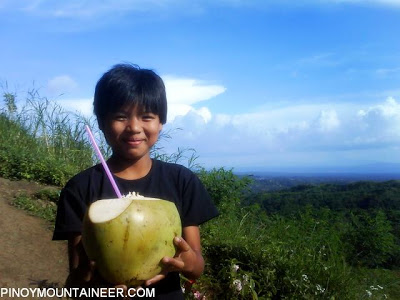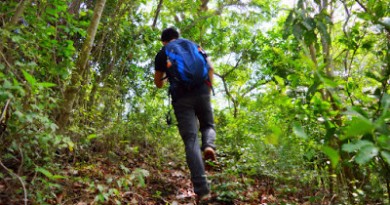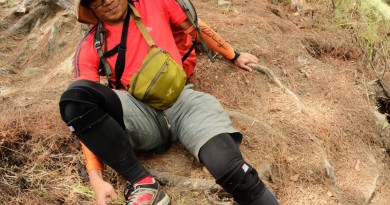Coconut water: Nature’s Gatorade

 This is an article belonging to the ‘climb health‘ category in PinoyMountaineer. Information provided in this article are based on research and are not meant as a substitute to actual medical advice and healthcare.
This is an article belonging to the ‘climb health‘ category in PinoyMountaineer. Information provided in this article are based on research and are not meant as a substitute to actual medical advice and healthcare.
I’m sure you’ve encountered – at one mountain or another – buko juice (coconut water is the international term) being offered by locals for thirsty mountaineers. The nice part is that after drinking the juice, they will cut the coconut into half, carve a spoon out of the shell, and offer the second course of the snack: coconut meat. Sarap gid!
Mt. Makiling has them at the nursery (the jumpoff point if you’re renting a jeep up the rough road) — and my mom and I would have one each as a reward after our weekly climbs (I miss those days!). After an exhausting solo climb up Mt. Iraya in Batanes, I was rewarded with fresh buco juice – and my guide in Mt. Hibok-Hibok even climbed up a coconut tree to get one for me because I was so thirsty at that excruciatingly hot day!
With coconut water virtually everywhere in our tropical country — whose most famous image to tourists is a beach framed by coconut trees — I’d like to raise the question: what are the merits of coconut water? Is it good trail water and does it compare with other sources of hydration (plain water, Gatorade?)
I was pleasantly surprised to find out that indeed, coconut water is good trail water! One of the most interesting trivia I gathered during the course of research is that coconut water was actually used an IV fluid (just like dextrose in the hospital) during World War II and it is still in use today in some developing countries. The reason? It has almost all the vital electrolytes the body needs!
As I mentioned in my latest Batulao blog entry, buko juice from a single coconut naturally has 650 mg of potassium (15x more than a banana), 25mg of magnesium, and 35 mg of sodium. Moreover (read this), a study in 2002 compared Fresh Young Coconut Water (buko juice), Carbohydrate-Electrolyte Beverage (Gatorade) and plain Water for rehydration after exercise. What were the findings? It turns out that buko juice was just as effective as Gatorade in rehydration, and it was also “significantly sweeter, caused less nausea, fullness and no stomach upset and was also easier to consume in a larger amount compared with (Gatorade) and plain water”!
And so whenever you come across those buko stalls, think again. Buco juice is not only a sweet treat, but a healthy source of trail water that will keep you up and trekking!
The blogger is currently a fourth year medical student at the University of the Philippines – Philippine General Hospital under the INTARMED program.





Leave a Reply
2 Comments on "Coconut water: Nature’s Gatorade"
it’s a diuretic, though.
Greetings! What’s the title of the 2002, study you mentioned which compared buko juice, gatorade and water? From which journal? Thanks!